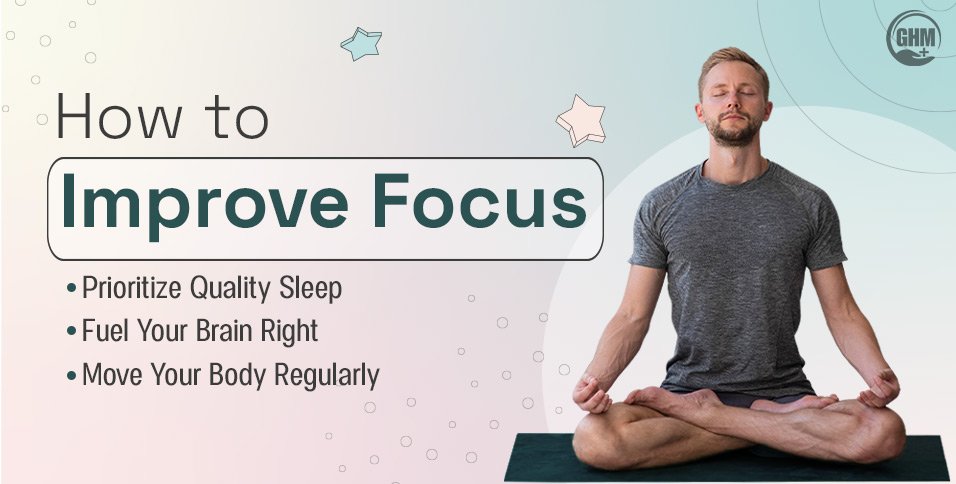Ever find yourself staring at your screen, but your brain is already thinking about lunch, emails, or tomorrow’s to-do list? You’re not alone. In today’s fast-paced world, learning how to improve focus is more important than ever. Better focus means more productivity, sharper memory, faster learning, and less stress throughout the day.
But let’s get this clear—this guide is for educational purposes only. It offers research-backed techniques to help you concentrate better, not medical advice. Always consult a healthcare professional before making health-related decisions.
Improving focus takes time, effort, and patience. Results vary from person to person.
In this blog, we’ll cover everything from fixing your environment and building smarter habits to using practical techniques that actually work. Whether you’re a student, a professional, or someone juggling both, this guide is your first step toward regaining control over your attention.
Understanding the Focus Challenge
Why is it so hard to focus today? The answer is simple — everything wants your attention. From social media to endless tabs, we’re stuck in an attention economy. In fact, as of 2025, the average person spends 6 hours and 40 minutes on their screen daily, which totals 46 hours and 40 minutes per week. This constant checking disrupts your flow, making it harder to learn how to improve focus, even for a few minutes.
Here are the common reasons people struggle to stay focused:
- Too many digital distractions: Notifications pop up all day. Tabs stay open. Our brain gets no rest.
- Multitasking myth: Doing many things at once feels productive, but it actually drops focus by up to 40%.
- Messy surroundings: Loud noises, cluttered desks, or background talk make it hard to think straight.
- Mind won’t stay still: When we feel bored, tired, or anxious, our thoughts start to wander.
- Poor self-care: Without enough sleep, water, or movement, the brain slows down. It loses its sharpness.
That’s why people looking for how to improve focus are turning to calming methods like acupuncture. Just like decluttering your room helps you think clearly, the benefits of acupuncture calm your nervous system. It lowers stress and improves mental clarity.
Want better focus? Start by turning off distractions—and letting your mind breathe again.
Building a Foundation: Lifestyle Habits for Sharper Focus
To truly learn how to improve focus, your lifestyle needs to support your brain. These four daily habits are powerful and proven to boost attention and clarity.
Prioritize Quality Sleep
Sleep gives your brain time to repair and recharge. It boosts memory, focus, and decision-making — all vital when trying to improve focus.
Tips to try:
- Stick to a consistent sleep schedule
- Follow a relaxing bedtime routine
- Avoid screens at least 1 hour before bed
- Keep your bedroom dark, cool, and quiet
Fuel Your Brain Right
Your brain needs steady energy to work well. The right foods help produce neurotransmitters that improve attention and mood, key to learning how to improve focus naturally.
Habits that help:
- Eat whole foods with lean protein, healthy fats, and complex carbs
- Drink enough water throughout the day
- Avoid sugary snacks and processed foods
Move Your Body Regularly
Physical movement increases blood flow to the brain, which sharpens focus and lowers stress.
Quick ways to move:
- Take short walks between tasks
- Stretch or move every 60 minutes
- Choose physical activities you enjoy
Manage Stress Wisely
Chronic stress weakens your ability to stay attentive.
How to reduce it:
- Try deep breathing or mindfulness
- Spend time in nature
- Do something fun or creative every day
Even small lifestyle changes can help. Just like the benefits of acupuncture calm your nervous system, these habits support your journey in discovering how to improve focus effectively.
Practical Techniques to Train Your Focus
Do you ever feel like your mind jumps from one thing to another without warning? You’re not alone. In 2025, researchers found that the average attention span has dropped to just 47 seconds on any single screen before switching tasks, which is a decrease from 2.5 minutes in 2004. But the good news is — you can learn how to improve focus. Just like muscles get stronger with workouts, your mind gets sharper with daily practice.
Let’s explore clear, practical techniques you can start using today to regain control over your attention.
Optimize Your Workspace
A clean and calm environment makes it easier to stay focused.
- Eliminate digital distractions: Keep your phone out of sight. Turn off notifications. Use app blockers like “Freedom” or “Focus Keeper.” Close tabs that aren’t useful.
- Tidy your desk: Remove clutter. Use neutral colors. Add a plant—greenery has been shown to boost concentration by 15%.
- Control noise: Use noise-canceling headphones. Try white noise or soft instrumental music if total silence feels hard.
These small changes make a big difference. They create a space where your brain feels safe to concentrate. Learning how to improve focus starts with controlling your environment.
Master Your Work Approach
Focus thrives when your work has structure and clarity.
- Single-tasking: Multitasking might feel productive, but it actually reduces output by up to 40%, according to the APA.
- Pomodoro Technique: Work for 25 minutes, rest for 5. Repeat four times, then take a longer break. This method boosts focus and keeps the brain fresh.
- Time blocking: Assign specific hours for deep tasks. Protect those blocks.
- Break down tasks: Divide bigger jobs into small, clear steps. It’s less overwhelming and easier to start.
- Set clear intentions: Begin each session by asking, “What exactly do I need to complete?”
If you’re serious about learning how to improve focus, start by setting specific goals and using your time with purpose.
Train Your Mind to Focus Better
You can train your brain just like your body. These mental workouts are simple and effective.
- Mindfulness and breathwork: Spend 2–5 minutes daily focusing on your breath. When the mind wanders, gently bring it back.
→ A USC study in 2025 showed mindfulness improved focus span in just 30 days. - Active listening: Pay full attention when others speak. No checking your phone. Just listen.
- Brain games: Use puzzles like Sudoku or apps like Lumosity. These help sharpen attention and problem-solving.
If you’ve ever wondered how to improve focus without changing your entire life, start here. These exercises take only minutes but build deep focus over time.
When Focus Fails: What to Do
It’s normal for focus to slip. The key is what you do next.
- Recognize and reset: Notice the distraction. Don’t judge. Just return to your task.
- “Be Here Now” method: Inspired by Kansas State’s “Spider Technique,” this involves gently saying “Be here now” to re-anchor your attention.
- Take micro-breaks: Step away for 60 seconds. Stretch. Look outside. These reset the brain.
- Change locations: Move to a different seat or room to refresh your energy.
- Reconnect with your purpose: Remind yourself why the task matters. A clear purpose brings natural focus.
These techniques teach you how to improve focus by showing that recovery is part of the process.
Pulling It All Together
Let’s look at a realistic sample of a high-focus day:
Morning
- Tidy your desk
- Set your goal
- Begin with one Pomodoro
Midday
- Walk outside for 2 minutes
- Do a breathing exercise
- Eat mindfully without screens
Afternoon
- Use time blocking for creative work
- Play low-volume focus music
- Finish with a puzzle or quiz
Evening
- Reflect: What helped? What didn’t?
- Reset your space
- Plan one intention for tomorrow
Why These Techniques Work
Focus isn’t just mental strength—it’s a system you build. Backed by science, these small habits shape your attention day by day.
By combining structure, mindfulness, and purpose, you teach your brain how to improve focus naturally. Over time, your thoughts become clearer, your actions more intentional, and distractions less powerful.
Cultivating a Focus Mindset
Learning how to improve focus isn’t a quick fix. It’s a long-term mindset shift that requires daily commitment. Like building a habit, staying focused takes both time and practice.
Start by being patient. Your brain needs time to adjust. You won’t see results in one day, and that’s okay. Focus is a skill, like reading or cycling. You fall, then try again. Over time, it gets easier.
When you lose focus, don’t be harsh on yourself. Instead of guilt, choose self-compassion. Just notice the distraction, then gently guide your mind back. That small redirection is where the growth happens.
Also, remember to celebrate the small wins. Finished one full Pomodoro session? Great. Stayed off your phone for an hour? That counts. Every win boosts motivation. And motivation builds momentum.
One more thing: don’t stick to one technique if it’s not working. Try different strategies. Maybe Pomodoro works for you. Or maybe time blocking fits better. The path to finding how to improve focus is different for everyone.
The goal is to stay curious, kind to yourself, and open to change. Keep experimenting. Keep learning. Focus grows with your mindset, one step at a time.
Key Takeaways
In a world that’s designed to steal your attention, learning how to improve focus isn’t just helpful—it’s essential. Research shows that the human brain isn’t wired to multitask; every time you switch between tasks, your brain uses extra energy to refocus. This process, called “attention residue,” lowers efficiency and increases mental fatigue.
That’s why techniques like time-blocking, mindfulness, and even breaking tasks into smaller chunks work—they reduce friction and allow the brain to engage in what’s called “deep work,” a state where true productivity happens. On a biological level, small wins like completing a Pomodoro session trigger dopamine releases, reinforcing focus as a rewarding behavior.
But here’s the catch: focus can’t be hacked overnight. It must be built, like a muscle, with patience and consistency. The goal isn’t perfect focus, but flexible focus—the ability to reset quickly when you drift.
In the end, focus isn’t about doing more. It’s about doing what matters, with clarity and intent. In a noisy world, that’s not just productivity. That’s power.



















